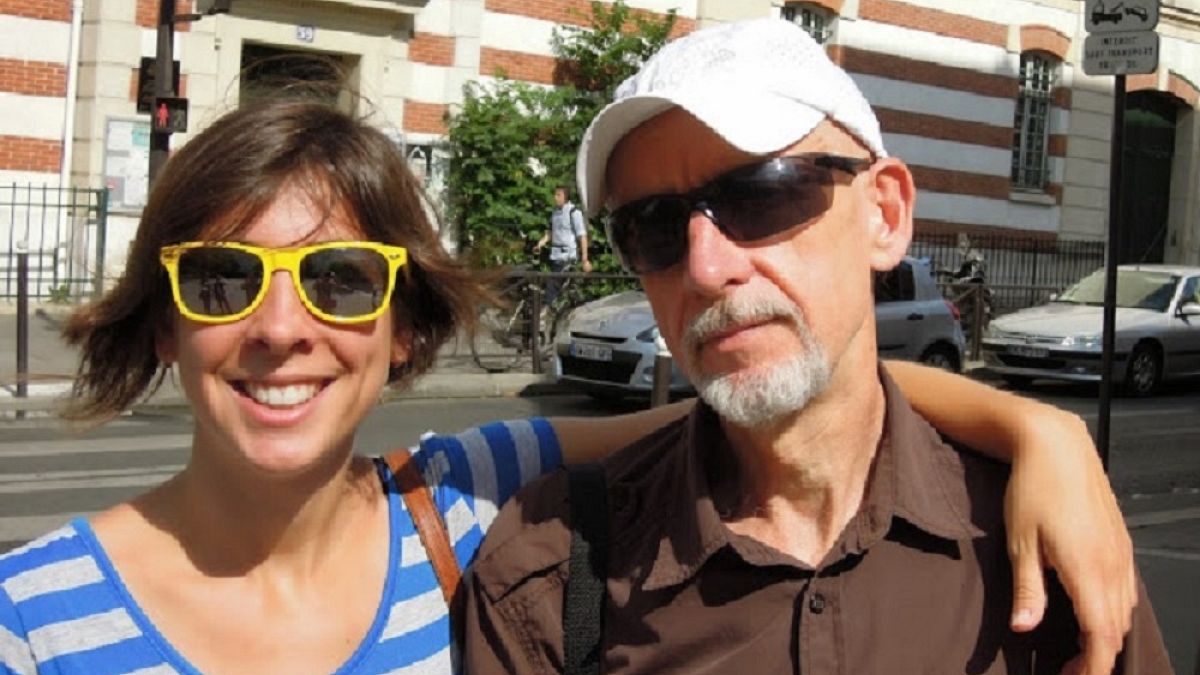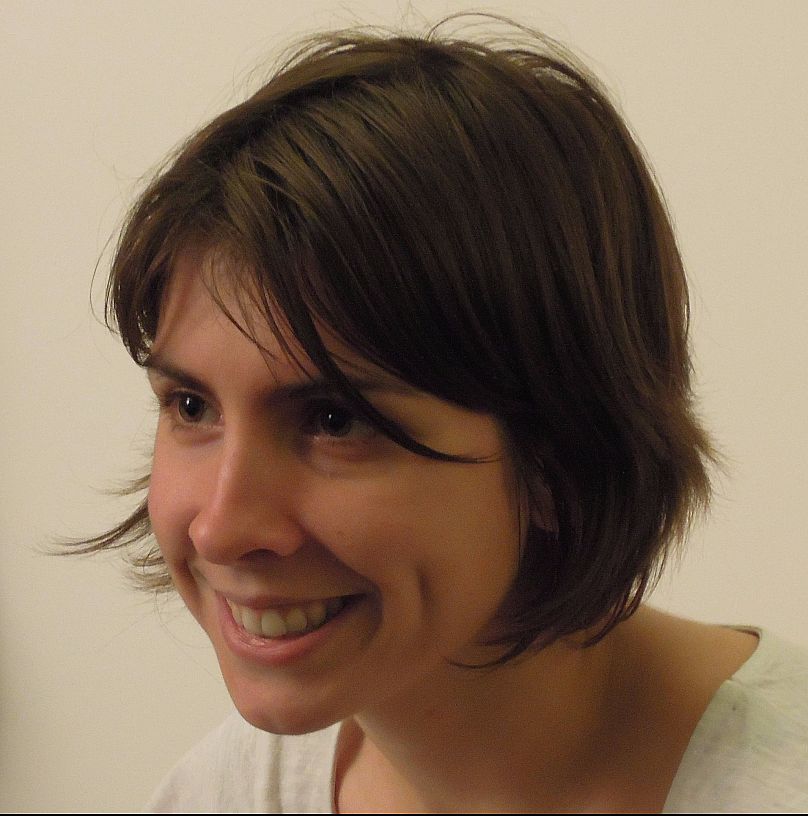After losing his daughter in the 2015 Paris terror attacks, Georges Salines founded an organisation for victims of the incident. He explains how sharing his experiences, with survivors, other grieving families and even extremists, is helping him to heal.
Lola Salines was 28 years old when she was killed in a terrorist attack at the Bataclan concert hall in Paris on 13 November 2015. Her father, Georges, founded an organisation for victims of the incident. He explains how sharing his experiences, with survivors, other grieving families and even extremists, is helping him to heal.
By Georges Salines
A social, caring soul
Lola was a very dynamic and lively young woman. She was a very gentle soul and very caring. She was also very funny and she had a great laugh. When she laughed, she was able to set off a whole room or movie theatre laughing after her.
She was quite curious and always ready to start new experiences. She went to rock festivals, and she liked to discover new sports, new activities and new countries.
She loved being with other people. When she went travelling, she used couchsurfing services. At home, she always had a roommate, because she didn’t like living alone.
She was an editor at a publishing company. It was her job and her passion. She edited children’s books and more recently, books for young adults. She had just started a series focusing on ‘geek’ culture, like YouTubers and video gamers.
The last time I saw Lola
I saw Lola for the last time on 13 November, 2015. It was at lunchtime. We used to work in the same neighbourhood in Paris. We met by chance on that particular day, because we both had the same idea to go to the local swimming pool during our lunch break. She was with a couple of her friends, so we exchanged a few words and I told her I’d see her the following day because she would usually come over to have lunch at our place on Saturdays. I went back to my apartment at the end of the day and I didn’t watch the news. My wife and I went to bed, and we weren’t aware of what was taking place in Paris.
We were woken up by a phone call shortly after midnight. It was our eldest son, who was calling because he had watched the news and he knew that Lola was at the concert at the Bataclan. He was unable to reach his sister on her cell phone, and of course, he was very worried.
That was the start of a very painful and difficult quest. For hours and hours, we didn’t know if she was dead or alive. At first, we were very optimistic. We thought that it was impossible that she was dead. After trying to reach the emergency number unsuccessfully throughout the night, we finally talked to someone early in the morning. But she only gave us the phone numbers of hospitals because Lola was not yet registered on their list. We called the hospitals and the coroner’s office. We drove to several hospitals. We started to post some messages on Twitter and Facebook, trying to ask for people to give us information.
It was on social media that we first learnt Lola was dead. There is no good way to learn that your daughter is dead, but it was particularly painful to find out this way.
The painful nature of this experience was one of the reasons I started to act, because my first impression was that we [the French administration and French society in general] were ill-prepared to manage this kind of situation. There was ample room for improvement and I wanted to contribute as much as possible.
The second and probably most important motivation for me to go public and later to start an organisation for survivors and victims, was that I was very afraid of the possible consequences of these attacks on French society as a whole. As the father of a victim, I wanted to say to the French society that a good way to react was not trying to have some revenge or do something irrational, but on the contrary, to try to find out why these things happen and how we could try to prevent them happening again.
I decided to talk to journalists about these two messages, but of course, my family and I were in a very difficult emotional state. During the first days and weeks after learning of Lola’s death, I stopped. I fully concentrated on my family and managing my pain.
Writing as therapy
I think the most therapeutic thing I did was write. My book “The unspeakable, from A to Z” was very personal, and it was really a healing process for me to start writing this. At first, it was just a way of remembering and keeping track of what was happening and the discussions we were having. I received a lot of letters expressing condolence for my loss, and maybe two-thirds of those letters started with “there are no words, or I have no words to express my sympathy.” It was difficult to speak about what happened, of course, but my family and I were talking all the time! So we used words. I started to make lists of words and tried to understand the meaning of each of those words. I did it alphabetically so it took shape as a kind of dictionary. For some letters there are one or two phrases, for others a few pages of explanation.
Solidarity among victims
At the end of December, I met some other parents of victims and survivors of the attacks and we decided to create this association that we called “13onze15: Fraternité et Verité” (French for the date of the attack, fraternity and truth). We wanted to testify and to go deep to the core of what happened, who was responsible and what could be improved, but with this notion of fraternity, which is one of the three words of the motto of the French Republic. There was this idea that we wanted to be friendly with each other and also society at large. We wanted to contribute to building a kinder world.
I made great friends and we are still very close to one another. Later, through this organisation, we also made contact with other people around the world who were victims of terrorist attacks. When I was in Boston a few weeks ago, I met a mother who just lost her daughter in the Parkland mass shooting in Orlando. I lost my daughter a couple of years ago, so I’ve made a longer way with my loss and I could share with this woman how I could cope. There is a sort of community of victims and we can help each other very much, simply by sharing our experience. Not staying alone -- this is very important.
But for me, personally, I have to say that since I happened to be the first chairperson of this organisation, it was also a very stressful task for me. I spent almost two years as the head of the organisation. Really, I don’t know if this organisation helped me personally or caused me too much stress [he laughs], but I think the most therapeutic thing I did was write the book.
I went through a learning curve. I think the association is very important, but maybe there should be different kinds of organisations for victims, with different objectives. We tried to organise the greatest number of victims possible, so we welcomed everybody. All of us wanted to get to know each other, to share our experience and comfort each other, but we also had our own motives — some were concerned about the administrative aspects, some in the memorial aspects, I was interested in prevention and understanding the roots of terrorism and radical extremism, others were interested in the police inquiry and the future trial.
As I’ve made friends in other countries, I think probably it’s better to have smaller organisations built around a single objective. We recently developed a very close relationship with a U.S. organisation founded by survivors of the Boston marathon bombing. Their goal was very simple: U.S. marines, who had been wounded in Afghanistan or Iraq, visited the marathon survivors to share their common experience of blasts and wounds, and how you could recover when you lost a limb, for example. That’s a very simple, but a very important idea.
Preventing extremism
I’ve also had contact with radicalised individuals and extremists through several channels. I participated in a conference in Paris, organised by a group called Families Against Terrorism and Extremism (FATE) that was created mostly by families of jihadis. I met a woman whose name is Dominique Bons, who lost her son in Syria.
I met the father of one of the three attackers of the Bataclan, at his request. I met him twice. It was very intense and very emotional for me. We went through his family photo album and he talked about his son, when he was a little boy and teenager, and what went wrong. It’s terrible, because this guy lost his son, and in a way he had lost him even before he died. He learned that his son was dead when the police broke down his front door, one or two days after the Bataclan attack. He didn’t know his son was in France; he thought he was still in Syria.
I met professionals who are engaged in deradicalisation, and I met former jihadis. I met a guy who was in Guantanamo. There are former jihadis and former terrorists and people who regret having been through this phase in their lives, but nobody knows exactly how you can encourage this process easily. These experiences are being discussed in France, but for now my efforts are not directed towards this level of ambition. My main focus now is to talk to young people who might have sympathies towards terrorism, to testify, and to show that violence is not the way. I explain that you can be religious without embracing violence, and simply, what I do mostly is to testify about my own human nature and the human nature of my daughter, the fragility of life, and the fact that she was fully innocent in what happened.
Georges Salines is founder and former chair of 13onze15: Fraternité-Vérité.
Opinions expressed in View articles are not those of euronews.

